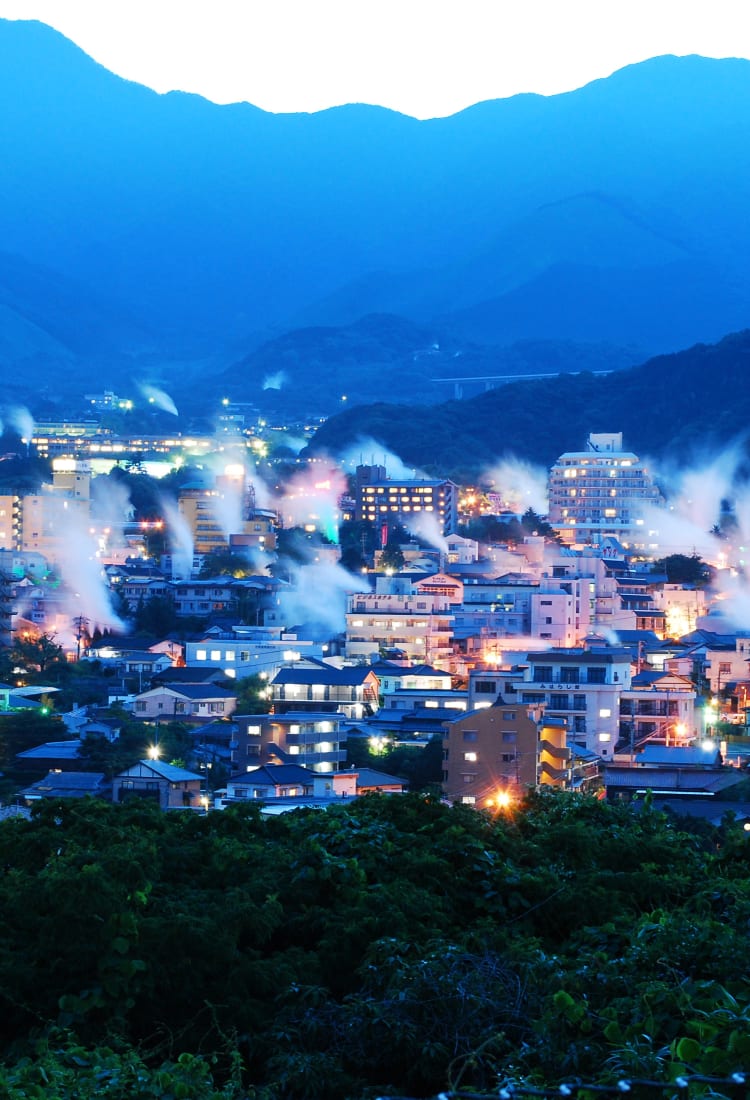
2025.03 Experience Japanese Culture in Oita Prefecture, Home to Japan’s Largest Hot Spring Flow[PR]
Oita offers a chance to experience the essence of traditional Japanese resort life, where visitors can relax in the natural beauty and healing power of its hot springs while savoring its exquisite cuisine. Moreover, Oita offers unique hot spring experiences that you won’t find anywhere else. Why not explore something new and experience the deep-rooted hot spring culture of Oita Prefecture? In this article, we’ll introduce two of its most famous hot spring regions: Beppu and Yufuin.
Beppu: A Hot Spring Paradise Gaining Global Attention
Beppu, one of Japan’s premier hot spring destinations, is often called the “Hot Spring Capital” and boasts the highest number of hot springs and the largest volume of hot spring water in Oita Prefecture. The entire town is enveloped in geothermal activity, with steam rising from hot springs throughout the area, creating a truly atmospheric welcome for visitors. Beppu is home to numerous hot spring areas, with the eight most iconic ones collectively known as Beppu Hattou, or the Eight Hot Spring Districts of Beppu. One of Beppu’s greatest charms is the sheer variety of hot spring experiences it offers.
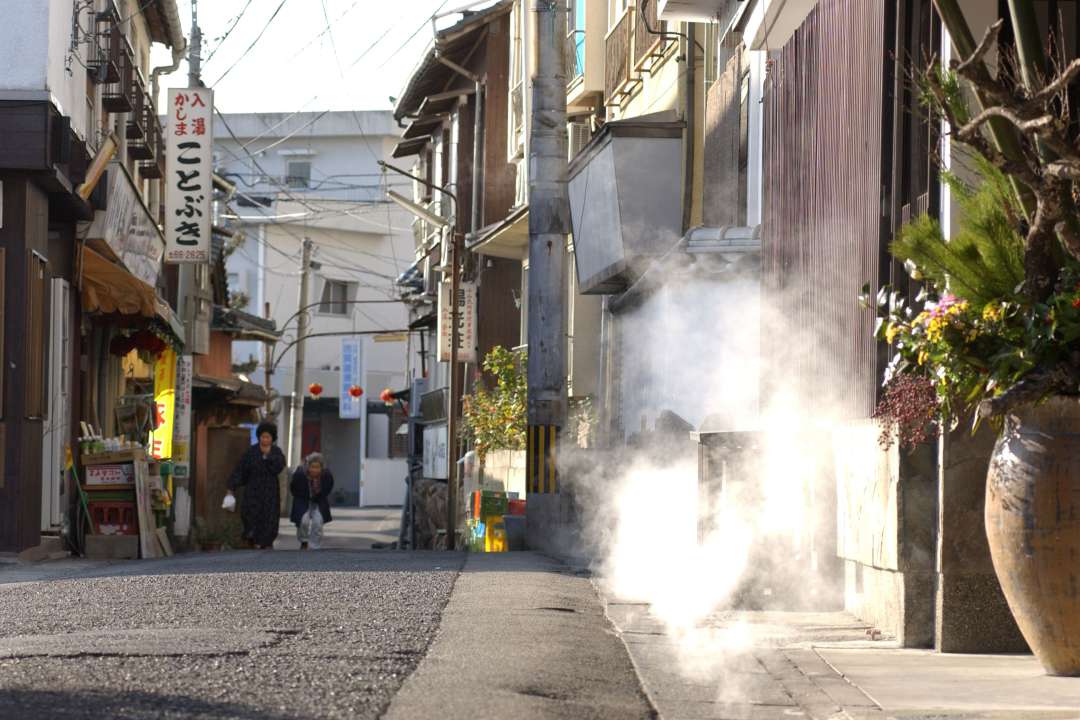

Steam rising from various spots throughout the city of Beppu
Hells of Beppu
A must-see attraction in Beppu is the Hells of Beppu, a tour that takes you around seven unique “jigoku”, or “hells”—hot spring vents formed by the sheer power of nature. The landscapes are otherworldly, unlike anything you’ll see elsewhere.
Among the seven hells, the Umi (sea) Jigoku captivates visitors with its striking cobalt-blue hot spring water, while the Chinoike (blood lake) Jigoku features vibrant red-hued hot mud. However, this isn’t just a collection of photogenic sights—it’s an immersive experience that lets you feel the mystery of Earth firsthand.

Nationally Designated Place of Scenic Beauty: Umi Jigoku

Nationally Designated Place of Scenic Beauty: Chinoike Jigoku
Kannawa Onsen and Geothermal Cuisine (Jigoku-Mushi)
Kannawa Onsen is a district in Beppu where an especially large amount of steam rises from the ground, creating a landscape that epitomizes a true “hot spring town.” The area has long prospered as a hot spring retreat, with numerous hotels and “ryokan” inns still standing today, making it an ideal place to fully relax and immerse yourself in the ultimate hot spring experience.

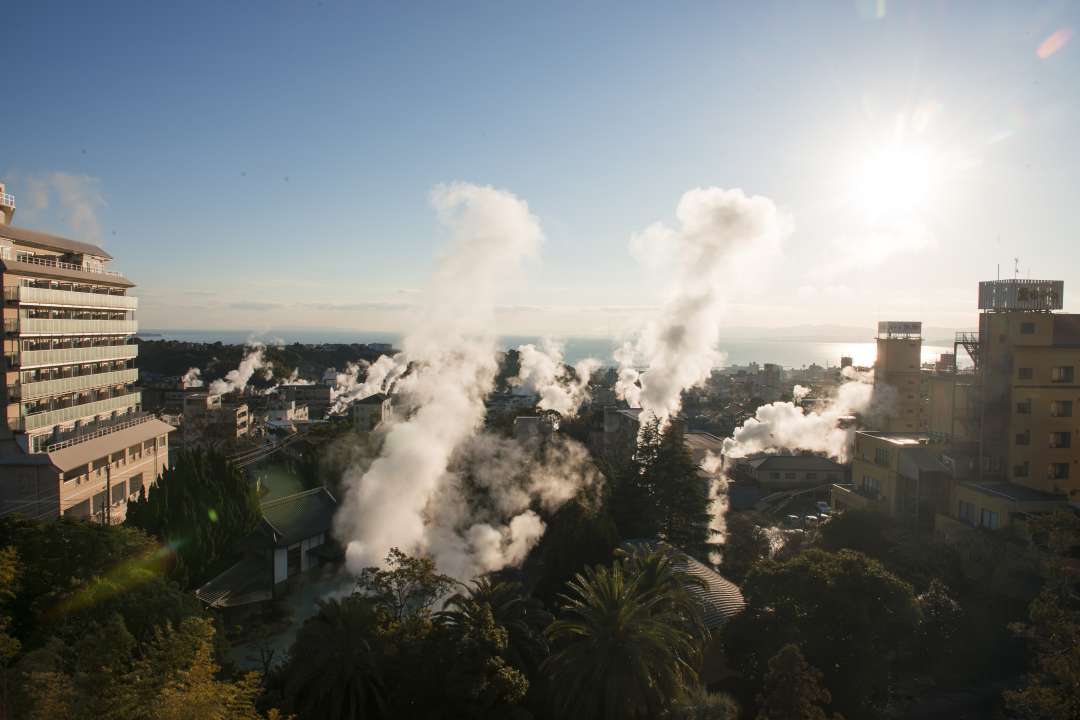
Hot spring steam rising from Kannawa Onsen
At Kannawa Onsen, don’t miss the traditional culinary experience of “Jigoku-Mushi”, or hot spring steam cooking. This method uses geothermal steam to cook ingredients without oil, preserving their nutrients. Due to the fact that it’s a simple, oil-free cooking technique, “Jigoku-Mushi” is especially popular among vegans and health-conscious diners.
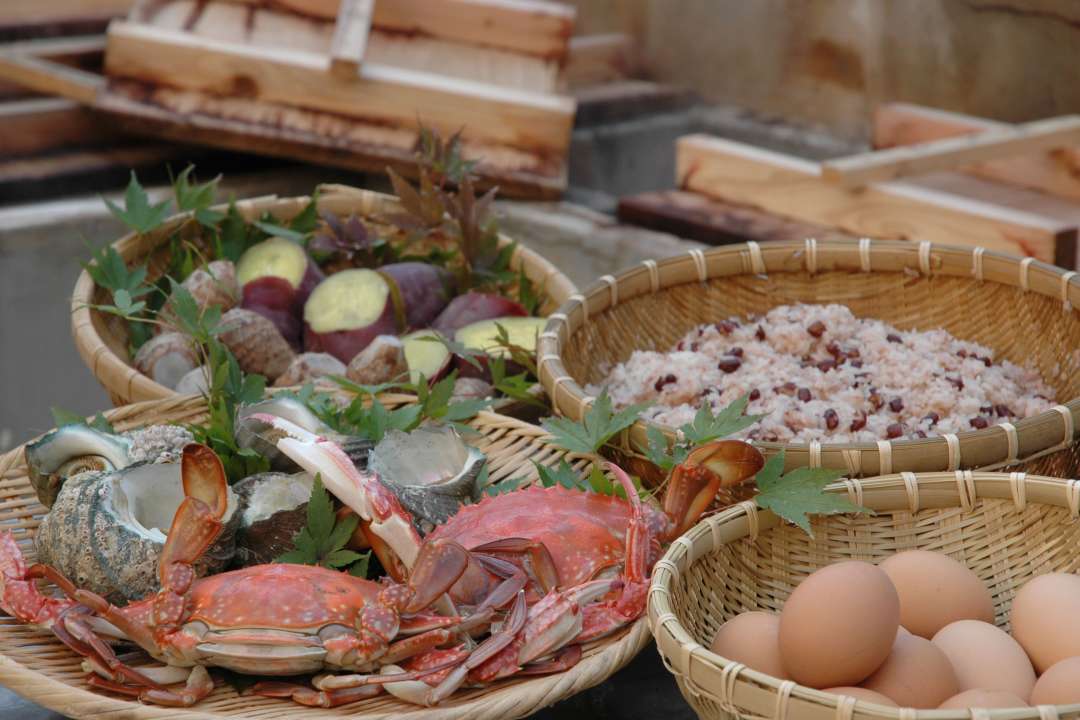

Geothermal cooking: “Jigoku-Mushi”
The restaurant Otto e Sette Oita has given traditional “Jigoku-Mushi” a modern twist. In addition to steam-cooked dishes, it offers “Onsen Italian” cuisine, which incorporates hot spring water in the cooking process.
Pasta is boiled using hot spring water instead of “dashi” (stock), sauces are simmered with geothermal heat, and fruits and vegetables are naturally ripened and fermented. Owner-chef Tetsuya Kakehashi presents this as a new evolution of hot spring culture. Indulge in dishes like hot spring-boiled pasta, beef cooked in geothermal steam, and seasonal fish prepared in the same way—all available as part of multi-course menus for both lunch and dinner.

Pasta cooked in hot spring water
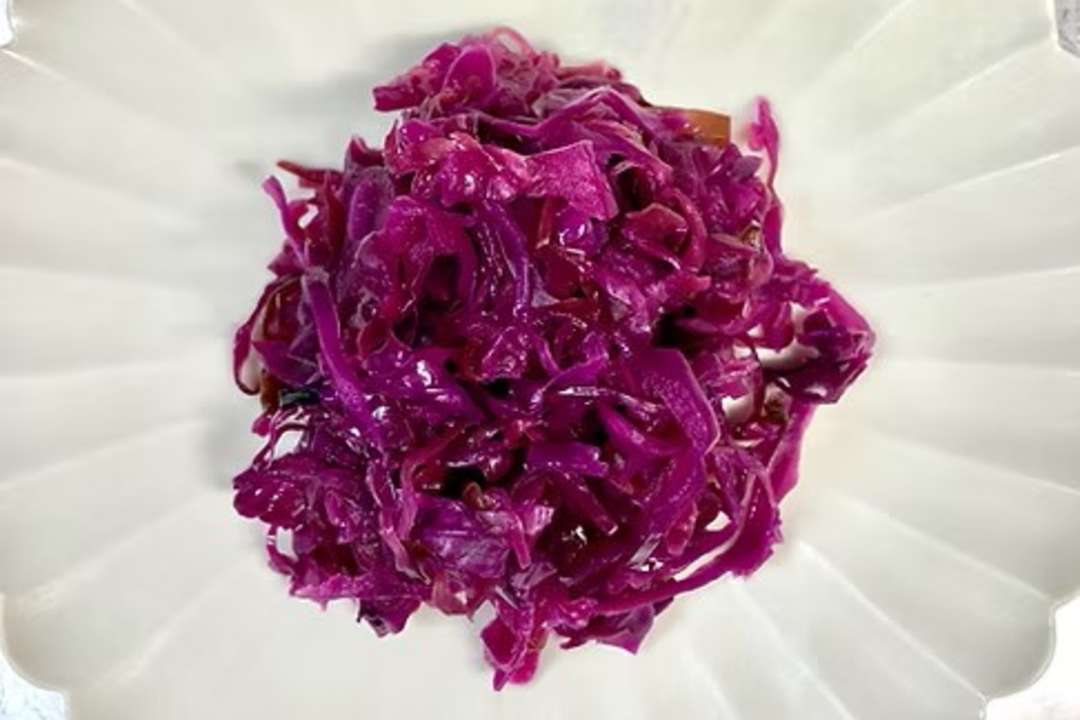
Vegetables simmered in hot spring water

Vegetables steamed in a “Jigoku-Mushi” cauldron with geothermal vapor

A sample lunch course menu
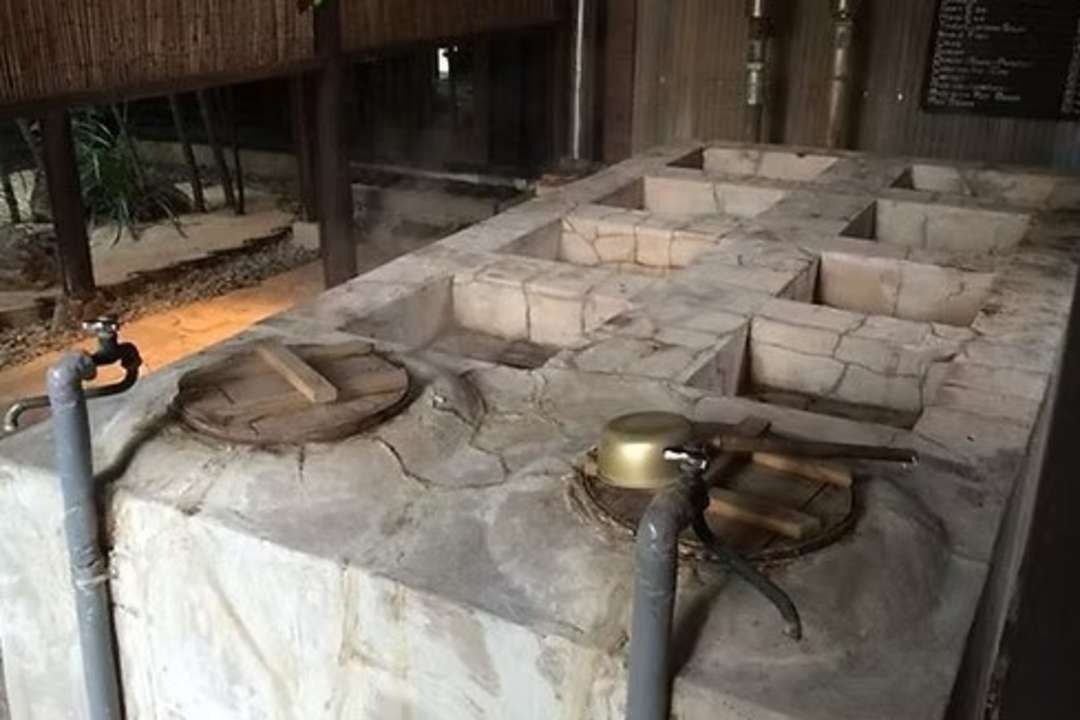
“Jigoku-Mushi” cauldrons

Steaming basket used for “Jigoku-Mushi”
Unique Hot Spring Experiences
A visit to Beppu wouldn’t be complete without experiencing its diverse hot springs. One such experience can be had at Kannawa Mushiyu (Kannawa Steam Bath), which has a history of over 700 years. Inside a stone chamber resembling a sauna, the floor is layered with the medicinal herb Sekisho (Japanese sweet flag), while geothermal steam gently warms the body. This traditional hot spring therapy promotes perspiration in a high-humidity environment, providing relaxing and detoxifying benefits.
Another unique experience is the sand bath, a traditional bathing method where the body is buried in geothermally heated sand, allowing its warmth to penetrate deeply. The sand, nourished by mineral-rich spring water, envelops the body to promote sweating, relaxation, and detoxification. Hyotan Onsen Hot Springs is one of the facilities where visitors can enjoy this therapeutic bathing method, along with open-air baths, waterfall baths, steam baths, and private family baths for a complete hot spring session.
For those looking to combine skincare with relaxation, mud baths—a bathing method using hot spring mud—provide the perfect option. The mineral-rich mud and hot-spring components help smooth the skin, improve circulation, and detoxify the body. At Beppu Onsen Hoyoland, guests can enjoy mud baths in an open-air setting surrounded by nature, allowing them to experience the benefits of Beppu’s geothermal wonders.

Kannawa Mushiyu (Kannawa Steam Bath)


Sand bath at Hyotan Onsen Hot Springs

Beppu Onsen Hoyoland’s mud baths
Yufuin: A Hot Spring Retreat where Healing and Art Converge
Yufuin is a picturesque and tranquil hot spring retreat nestled near the center of Oita Prefecture. Spreading out at the foot of the majestic Mount Yufu, this hot spring destination offers a serene contrast to the lively atmosphere of Beppu, allowing visitors to unwind in a peaceful natural setting.
During the tourism development of the 1970s, Yufuin was inspired by the German spa town of Badenweiler, shaping a setting where nature, hot springs, and art harmoniously coexist. Even today, the area retains a distinct European charm, with art museums, cafes, and galleries scattered throughout the town.

The tranquil landscape of Yufuin with Mount Yufu in the background
Lake Kinrin
Lake Kinrin offers a breathtaking, almost dreamlike scenery. Fed by hot spring water, the lake maintains a relatively high temperature, causing mist to rise from its surface in the early mornings, especially during the colder months. Visitors are invited to take a leisurely stroll along the shore and immerse themselves in this enchanting scene.

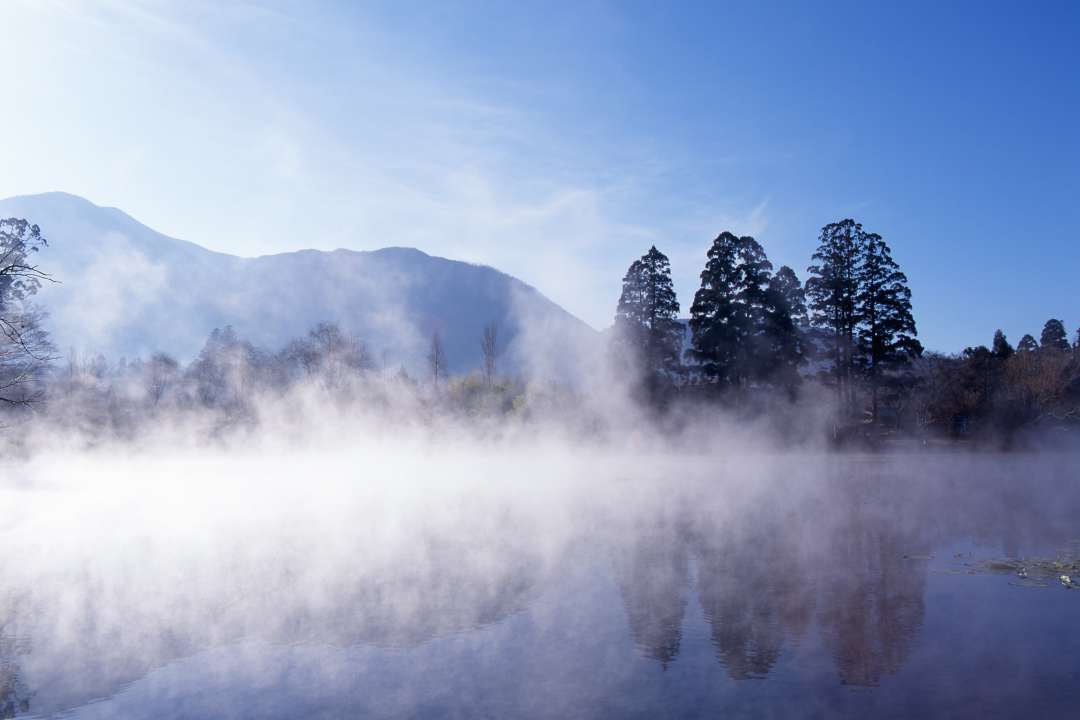
Morning mist over Lake Kinrin—its appearance changing with the day
Hiking Mount Yufu and Cycling the Yamanami Highway
For those seeking an active experience, hiking up Mount Yufu is recommended. As the symbol of Yufuin, this beautiful 1,583-meter peak offers well-maintained trails suitable even for beginners. From the summit, hikers are rewarded with incredible views of the Yufuin townscape and surrounding mountains.

Mount Yufu
Cycling along the Yamanami Highway is also a must-try, especially as it serves as the main trailhead for climbing Mount Yufu. Even for those who aren’t avid cyclists, the experience proves irresistible, riding through the wind while taking in views of the majestic mountain. It is possible to rent bicycles in Yufuin, but for an even better experience, head to Yamanami Rental Cycle in Kokonoe Town, where you can cycle through beautiful scenery that stretches all the way to the Aso area.

Mount Yufu as seen from the Yamanami Highway

Yamanami Highway at Kokonoe Town
Yufugawa Gorge Packrafting Tour
Yufugawa Gorge offers magnificent natural beauty, with a mysterious landscape shaped over countless years. Why not embark on an adventurous tour using a lightweight rubber boat to explore deep, uncharted parts of the gorge? There, you’ll encounter views unlike any other, including beautifully sculpted rock walls and countless waterfalls cascading like threads from the cliff faces.
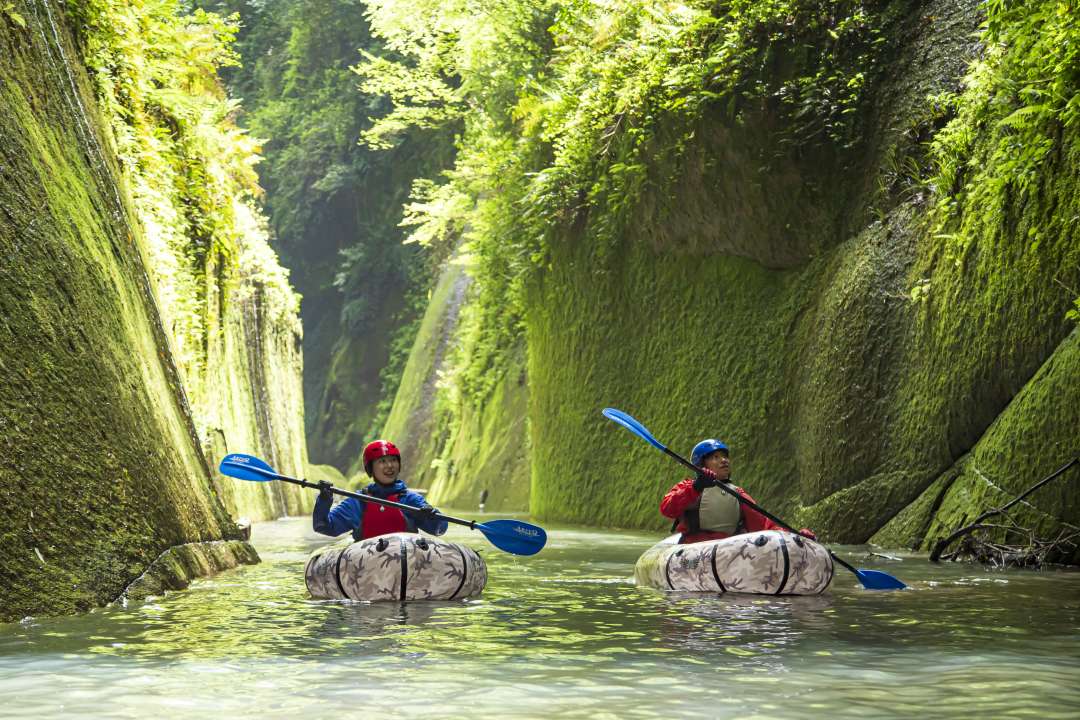

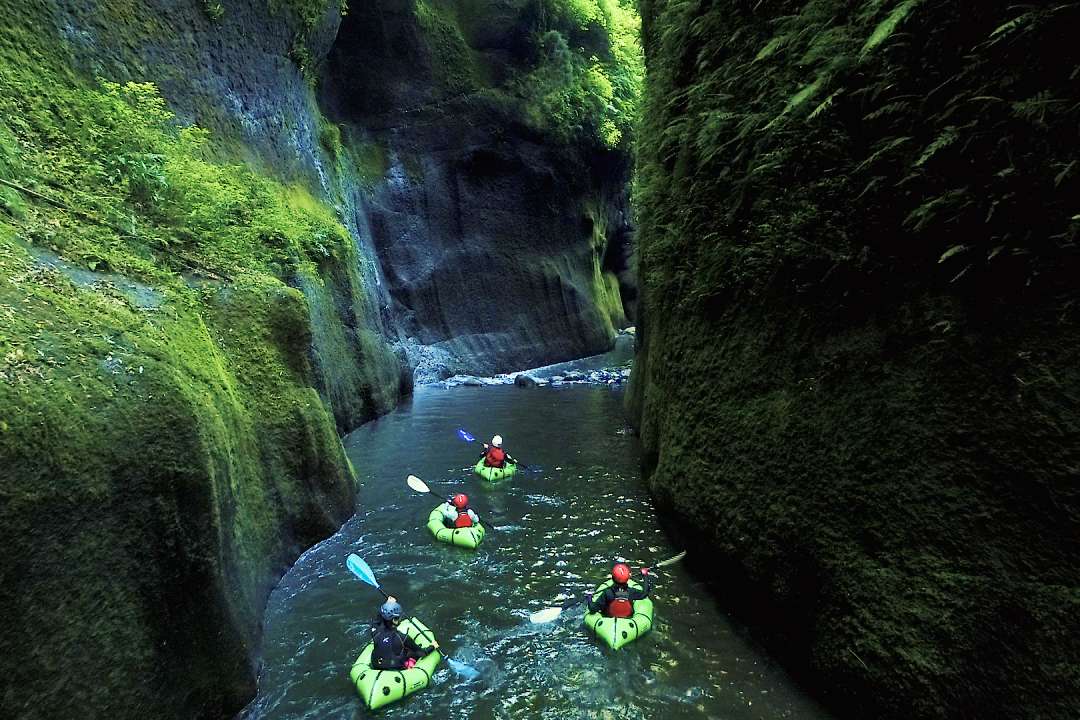
A Fulfilling Experience Spent Savoring the Town's Natural Beauty
A stay in Yufuin offers the perfect opportunity to unwind and be healed by its hot springs. Surrounded by the natural beauty of the town and watched over by Mount Yufu, visitors to the town can tour art museums or take leisurely strolls through the picturesque satoyama - a traditional rural landscape where nature and human habitation coexist in harmony. This leisurely time will leave you feeling recharged, body and soul.
At the COMICO ART MUSEUM YUFUIN, enjoy modern art within a sophisticated space designed by Kengo Kuma. Meanwhile, visiting Unagihime Shrine, which dates back to the 9th century, or Ogosha Shrine, home to a giant cedar tree over a thousand years old, offers a chance to connect with Japan’s spiritual culture. The mystical atmosphere of these ancient sites reflects the thoughts and traditions of the locals which have been preserved for centuries.

COMICO ART MUSEUM YUFUIN, designed by Kengo Kuma
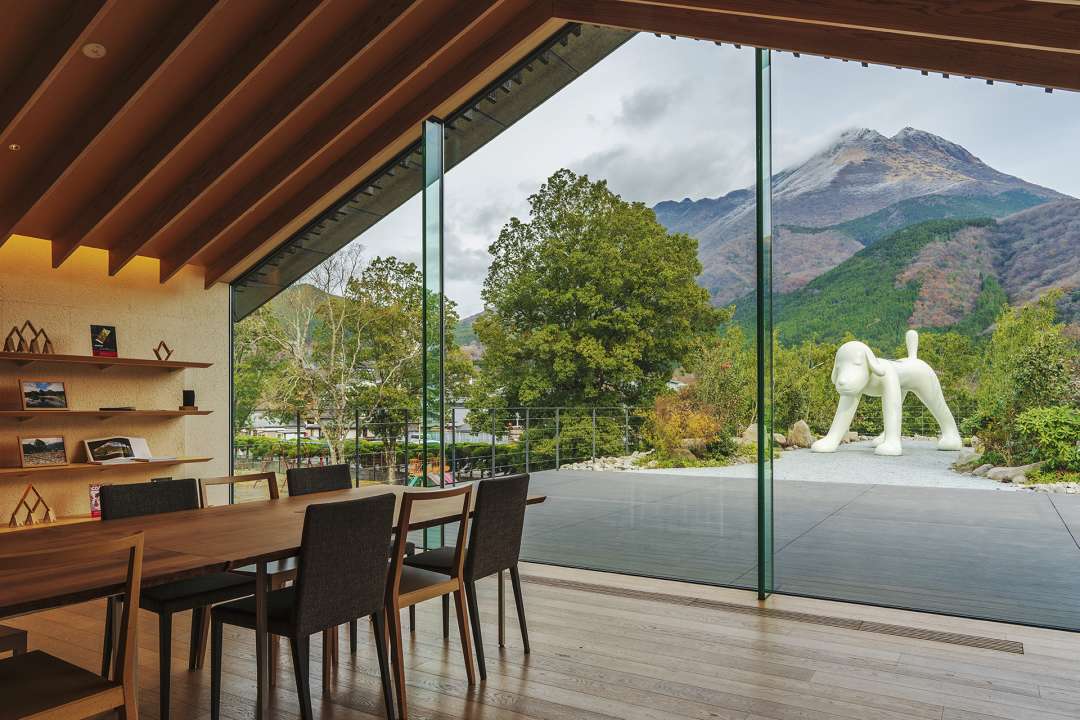
© Yoshitomo Nara 2017
Looking out at Yoshitomo Nara’s artwork, “Your Dog”

Unagihime Shrine

Ogosha Shrine

The giant cedar tree at Ogosha Shrine, over a thousand years old
ENOWA YUFUIN: Savoring the Luxury of Farm-to-Table Cuisine and Hot Spring Culture
For the Japanese, hot springs are special spaces for healing both body and soul. Historically, hot springs were used for long-term stays focused on recovery, often referred to as “hot-spring therapy.” In recent years, the trend has shifted toward enjoying hot springs while staying at a ryokan inn and indulging in gourmet delights, leading to the rise of luxury hot spring resorts.
ENOWA YUFUIN stands out by offering a luxurious retreat where guests can savor the finest cuisine crafted from fresh vegetables grown on its own farm. Nestled in the abundant natural beauty of Yufuin, this auberge offers guests the opportunity to reconnect with nature and rediscover their true selves amidst expansive grounds.
Embracing the farm-driven philosophy of “the menu for the day is decided by the farm,” each dish celebrates the vitality of nature for guests to enjoy. The robust flavors of the ingredients, nurtured from the soil up, will leave a lasting impression on your journey.
All guest rooms are equipped with open-air baths filled with natural hot spring water, allowing guests to immerse themselves in the healing waters of Yufuin in the privacy of their own space. The premium suite, with its picturesque view framed by an infinity pool, offers a one-of-a-kind escape.
Why not take your Japanese hot spring experience to the next level? Awaken all your senses as you embrace the mineral-rich earth and the natural blessings of Yufuin through its hot springs and cuisine.

The entrance to ENOWA YUFUIN, an auberge nestled in nature

A fertile field cultivated from the soil up, with Mount Yufu in the background

Dishes brimming with vitality, nurtured by the power of the earth

HILL TOP SKY PAVILION, a premium suite featuring an infinity pool
How to get there
Oita Prefecture is easily accessible from Fukuoka, taking about two hours on the Sonic Limited Express train from JR Hakata Station. It can also be conveniently reached from areas like Osaka and Kyoto by plane or Shinkansen. Additionally, the Sunflower ferry connects Osaka with Beppu and Kobe with Oita, offering a one-night boat trip as part of the journey.
Related Links
Oita Prefecture Official Multilingual Tourism Website |
| URL: https://oita-tourism.com/en/index.html |
SNS |
|
Official Facebook of Oita Prefecture URL: https://www.facebook.com/welcometooitapref/ Official Instagram of Oita Prefecture |
Hells of Beppu |
| URL: https://www.beppu-jigoku.com/ |
Otto e Sette Oita |
| URL: https://www.ottoesetteoita.com/reservations |
Hyotan Onsen Hot Springs |
| URL: https://www.hyotan-onsen.com/english/index.html |
Beppu Onsen Hoyoland |
| URL: https://hoyoland.net/eg.html |
Yufuin Hiking Trail Map |
| URL: www.city.yufu.oita.jp/uploads/files/2023/11/yufudakemapEnglish.pdf |
Yufugawa Packrafting Tour |
| URL: https://www.yufuism.jp/packraft/ |
COMICO ART MUSEUM YUFUIN |
| URL: https://www.camy.oita.jp/en |
ENOWA YUFUIN |
| URL: https://enowa-yufuin.jp/?locale=en |




















































